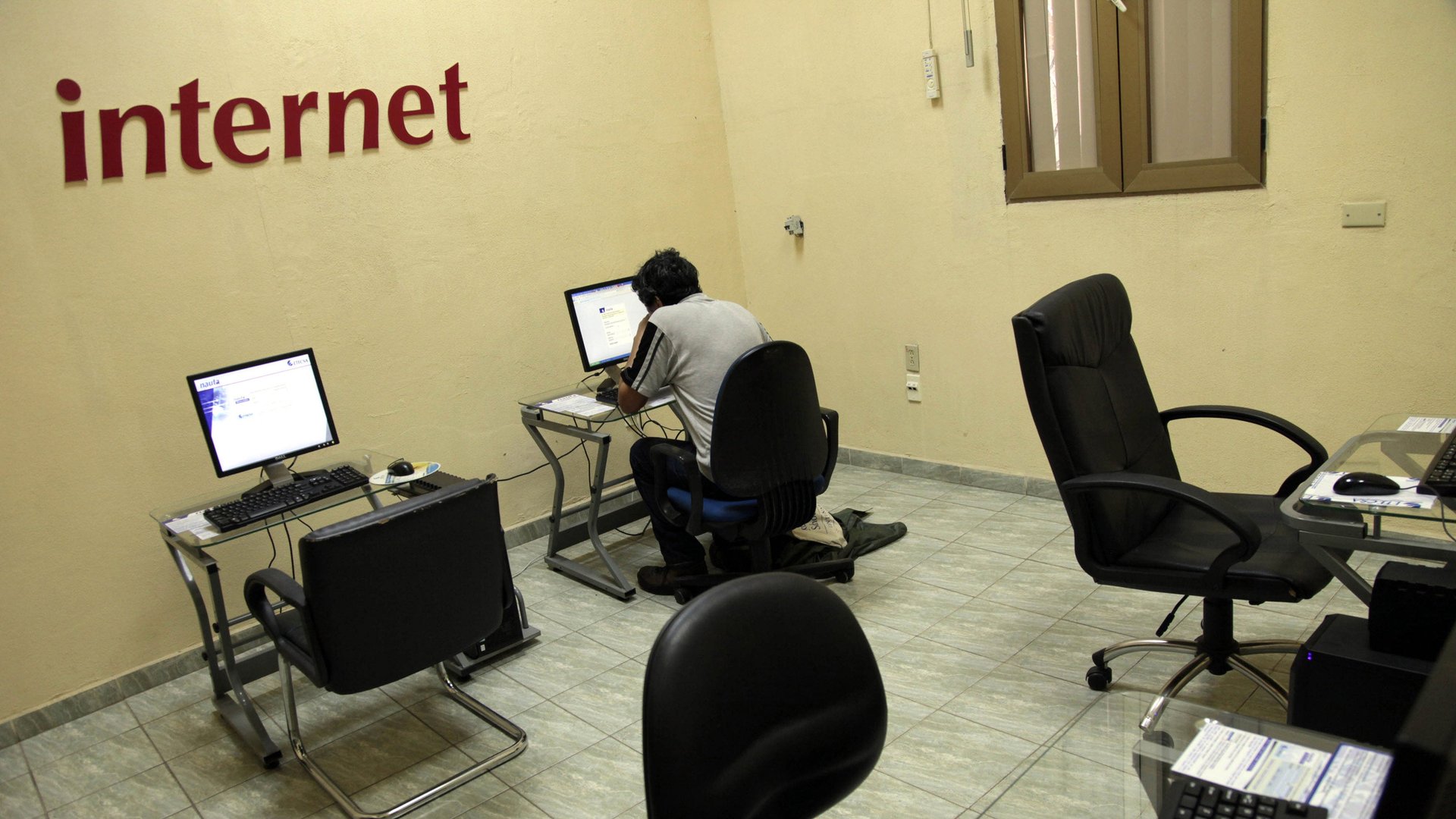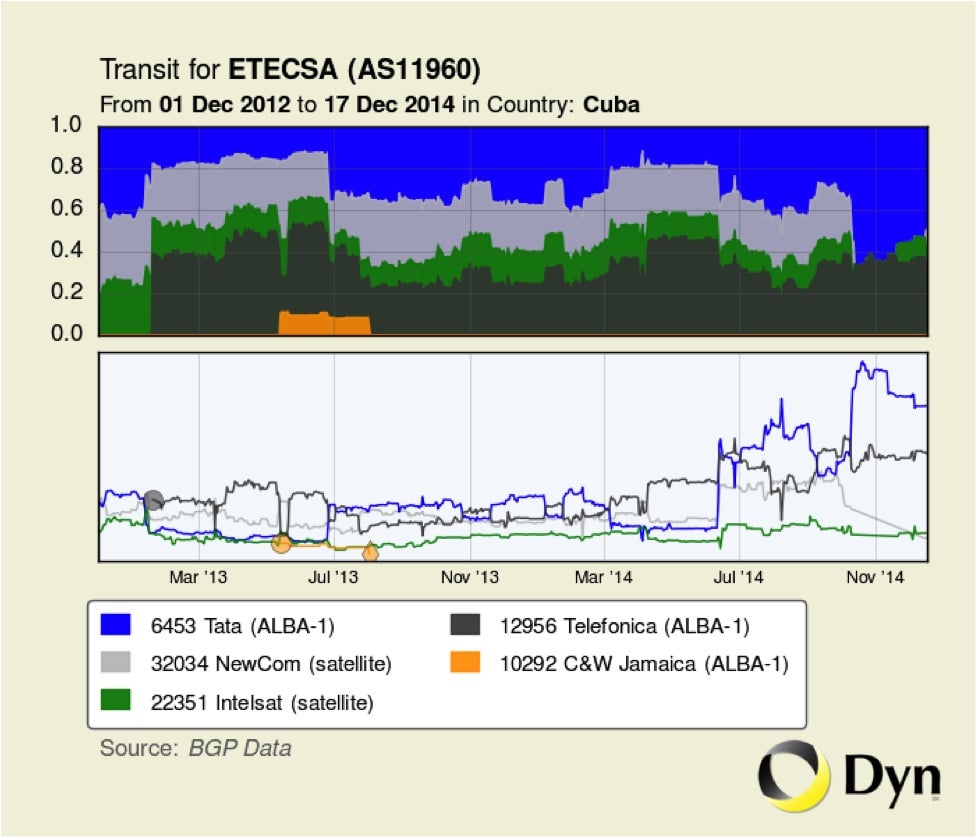Cuba’s sole underwater Internet cable is going to see a lot more traffic – and some company
Nearly two years ago, the Internet research company I work at, Dyn, broke the story about the activation of the first submarine cable connecting Cuba to the global Internet—a cable that, prior to its activation in January 2013, mysteriously lay dormant on the ocean floor for nearly two years. When the Cuban government issued a confirmation in the days following our report, it contained the following statement:


Nearly two years ago, the Internet research company I work at, Dyn, broke the story about the activation of the first submarine cable connecting Cuba to the global Internet—a cable that, prior to its activation in January 2013, mysteriously lay dormant on the ocean floor for nearly two years. When the Cuban government issued a confirmation in the days following our report, it contained the following statement:
When the testing process concludes, the submarine cable being put into operation will not mean that possibilities for access will automatically multiply.

In other words, Cubans should not expect greater access to the Internet just because the ALBA-1 submarine cable was now in operation. Yesterday’s historic agreement to begin normalizing relations between Cuba and the United States contains a pledge by the Cuban government to “greatly expand its citizens’ access to the Internet.” What exactly this pledge entails will determine how the Internet evolves in Cuba in the near term. Decision makers in Cuba should look at another country that recently opened up its telecom sector and is presently experiencing an explosion in Internet growth: Myanmar.
Cuban isolation
The isolation of Cuba is plainly evident when looking at a map of the submarine cables in the Caribbean. While numerous cables crisscross the Caribbean, they all avoid landing on Cuba. That is, all except for ALBA-1 submarine cable, built by Alcatel Submarine Networks and financed by the Venezuelan government.

How much can the lack of Internet development in Cuba be attributed to the US trade embargo? Recall that in 2009, the Obama administration lifted the ban on US companies providing telecommunications services in Cuba as well as cleared the way towards the installation of a new submarine cable to connect Cuba to the US. However, this measure changed very little and no cable has been built to the US.
As part of this week’s announced plans to normalize relations with Cuba, the United States has lifted the ban on exporting telecommunications equipment to Cuba. How much this restriction accounted for the present lack of Internet development in Cuba isn’t clear. Even without access to US vendors, Cuba could acquire equipment from vendors from other nations. For example, they could have been upgrading their infrastructure with Chinese gear, but they weren’t doing that. Perhaps due to the fact that under sanctions, Cuba had very little foreign reserves with which to purchase expensive foreign imports like oil, cars, or networking equipment, and nobody was volunteering to subsidize their infrastructure.
It is really Cuba’s pledge to provide greater access to the Internet to its citizens that could be the most transformative development with respect to the Internet in Cuba.
Internet in Cuba
The following graphic depicts the current layout of the Cuban Internet as represented in Internet routing (BGP). US Department of Defense Autonomous Systems (ASNs) along the bottom represent Internet service to the Guantanamo Bay Naval Base. Otherwise, all Internet access goes through the Cuban state telecom ETECSA (AS11960). ETECSA has four international providers connecting it to the outside world. Telefonica and Tata provide service over the ALBA-1 submarine cable and Intelsat and NewCom are satellite providers.

In the transit shift plot below, we can observe how ETECSA has distributed traffic to its providers over the past two years. The entrance of Telefonica in January of last year (dark grey) coincided with the activation of ALBA-1. The brief period of service from Cable & Wireless Jamaica (yellow) corresponded to the activation of ALBA-1’s branch to Jamaica, intended for backup purposes.

From a purely technical standpoint, the activation of the ALBA-1 cable was a dramatic improvement for ETECSA’s connectivity to the outside world. Submarine cable fiber optics offer far greater amounts of bandwidth with much lower latencies than the bulk satellite service that they had been reliant on for years. From a performance standpoint, it was a tremendous improvement. However, now the challenge for the Cuban government is to extend that connectivity from Siboney Beach to the Cuban people. Below is a screenshot from Dyn Internet Intelligence showing latencies to Havana, Cuba from cities around the world.

Almost all of Cuba’s international Internet traffic has been passing through the United States for as long the Internet has existed in Cuba. For example, the satellite ground stations for the satellite service they currently use are on the East Coast of the United States. (Note: Tata service to Cuba was formerly via satellite and used a ground station in Canada. Of course, Canada also primarily connects to the outside world through the US.) The Telefonica and Tata service across the ALBA-1 cable eventually eventually makes its way to Miami to reach the global Internet. For technical reasons and not necessarily political, it is very hard to avoid the gravitational pull of the United States when routing international Internet traffic in the western hemisphere.
The networks for Guantanamo Bay Naval Base presently go over satellite, but last year the DoD announced that it would run its own submarine cable from Florida to Guantanamo Bay to offer better Internet service for the military installation. According to a DoD official testifying at a war crimes tribunal, “it’s going to be for the entire island in anticipation that one day they’ll be able to extend it into mainland Cuba.” So perhaps the second submarine cable to serve the nation of Cuba might come via the Gitmo detention center.
Myanmar as a model for Cuba
If the Cuban government is truly committed to opening up greater access to the Internet for the Cuban people, its decision makers should carefully review the case study of Myanmar over the past three years. Like Cuba, Myanmar was considered one the last green fields of telecom—countries with virtually no telecommunications infrastructure. But just as the transformative growth did not come from Myanmar’s state telecom MPT, ETECSA is unlikely to be leading the way in Cuba. This isn’t a knock on ETECSA, it’s just that legacy fixed-line incumbents are not equipped or manned for the task for rapid deployment of mobile infrastructure. Cuba needs outside help, but to do so Cuba would need to adopt a capitalist mentality.
Presently, Myanmar is experiencing an unparalleled explosion in the growth of Internet access due to the entrance of two private foreign mobile operators that won licenses in a competitive bidding process in 2013. See the AFP piece about what is happening in Myanmar in the clip below:
Despite being one of the poorest countries in Asia, 15-year licenses went for $500 million dollars and the winners had to pledge to build out infrastructure to cover 90% of the population in a country of 60 million people spread across the jungles of southeast Asia.
Why did entering Myanmar seem so attractive that over a dozen international mobile operators competed for these licenses? It likely had to do with the fact that Myanmar dispensed with the typical protectionist requirements that can stifle interest such as requiring domestic partners or putting caps on foreign ownership. Outside companies felt like they could come in and operate without being loaded down with requirements that might decrease their profit potential. The result is a rapid growth of Internet access that is having profound impacts on life in Myanmar from empowering women to connecting up libraries. For an example closer to home, Cuba might consider the example of Mexico, where President Nieto’s telecom reforms have eliminated caps on foreign ownership in a bid to increase competition and reduce prices.
Conclusion
In the past two years, there have been some modest steps towards greater access to the Internet in Cuba. These have included the activation of the ALBA-1 submarine cable, opening of Internet access points, and the introduction of mobile Internet service. However, access to the Internet is still limited for a variety of reasons including price of service and outdated technology.
Cuba’s pledge to increase Internet access for their citizens is a very hopeful sign and appears to be a departure from its warning last year that the activation of ALBA-1 “will not mean that possibilities for access will automatically multiply.” We will have to wait and see what precisely this pledge entails to really understand its implications for the future. However, there is reason to believe that impressive growth being experienced currently in Myanmar could be replicated in Cuba—but it would require a capitalist approach for one of the world’s last remaining communist countries. In Cuba, such a mind shift would be… revolutionary.